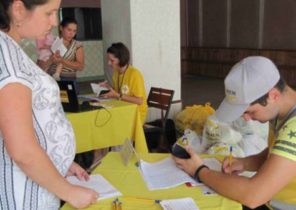
Media that does not follow the line of the Kremlin, has long been difficult to gain a foothold on the Russian media market. The result is a professional working state media actually enjoyed a monopoly in the Russian-speaking world, suppressing independent opinions and displacing material critical of official Russia.
Now on the market, a new digital network for Russian-speaking audience, and its creators hope to break through the drumbeat of the Kremlin’s rhetoric, focusing on the local problems and people’s daily life.
On Tuesday in the framework of the project “Real time”, created with the support funded by the United States the station “Radio Free Europe/Radio Liberty” and acting in partnership with radio station “Voice of America”, was launched-hour Russian-language TV channel. Last year, the project website was created. Digital network in the state of which about 100 employees working in Prague, and correspondents working across the region, will broadcast in 11 countries of the former Soviet Union, including Russia, Ukraine, Central Asia and the Baltic States.
“In the center of our attention, real people and everyday problems, said in an interview with Foreign Policy Director of the TV channel “Real time” Sindelar Daisy (Daisy Sindelar). The video really focuses on everyday, but human problems such as corruption, poverty, and health”.
The project was created after European Union officials stepped up criticism of the media controlled by the Kremlin. Often when covering such issues as the conflict in Ukraine, NATO as well as internal problems in countries with large Russian-speaking population, the tone is set by Russian state media, like RT and Sputnik. Sometimes they have their false information to promote debate and disagreement.
“Russia is trying to destabilize and influence opinions and attitudes in the Western societies, says Anna Fotyga (Anna Fotyga), MEP from Poland, member of the European Council and the author presented in last year’s EU report on misinformation from Russian media. — I believe that a Russian satellite and digital network is an excellent response to that threat.”
Perhaps the TV channel “Real time” it will be difficult to divert the audience’s attention from well-funded public media, “pumped up” dramas, scandals and characterized by pathos and gloss. The new channel will have to stay within a budget much more modest than those that have official and authoritative media. However, local TV channels included in the network through which the “Present time” extends to the content are often hesitant to broadcast foreign programs, fearing that going against the official line, they may lose advertising revenue.
“In the near future we do not expect that our presence in Russia will give a significant result,” says Sindelar.
The creators of the project “Now” believe they’ll have better luck if they are to turn to the multimillion Russian-speaking audience of the region through smart phones, using videos, telling about people and touching on issues of local importance. Using digital platforms have managed to gain from the January 2016 over 200 million views on sites such as YouTube, Facebook and the Russian social network “Vkontakte”.
Glenn kates (Kates Glenn), chief editor of digital broadcasting of the channel “Real time”, said the team was inspired by the growing popularity of short videos with subtitles to Facebook offered by such media as the “al-Jazeera+”, Buzzfeed and other news sites that are better than others managed to reach the audience in social networks.
“I saw that these videos can cause people’s interest, and realized that there is no reason to doubt the material that’s on there will work,” he said.
Channel “Real time”, which related to the U.S. Board of governors on issues of broadcasting and funded by the US government, will also have to deal with the criticism that he also has his own “paid” state editorial point of view.
Sindelar, disagrees and contends in response that the Russian government is pouring millions into his glossy media industry, giving independent channels able to Express other points of view. In her words, “the Present time” does not impose political views, and only covers the issues of human rights and the rule of law.
“We offer the Russian-speaking audience one of the few alternatives to the mass media, which clearly koordiniruyutsya government, says Sindelar. — I think in the end we will get an audience who knows what will come to us and get accurate information on issues of importance to them — without any PR gloss, distortion of the meaning and manipulation of the facts”.
That they focus not on politics, and talk about life, will allow them to distribute their content in Russia, say, Sindelar and cates. Some programs like project “Unknown Russia” give an idea about life in different corners of Russia and tell the audience about people living in remote regions where few Russians ever been. In other programs offers practical advice. For example, the project “Business plan” is a series of stories about the creation of startups in Ukraine.
But in programs there will be more hot topics. For example, in one of the shows recently used materials video and audio from your smartphone, depicting a gruesome scene — a rough and brutal actions of the police (and the attempt to hush up the incident) in Russia.
Other digital materials used animation to help you understand obscure issues like a new and complicated law about surveillance in Russia.
“Our project is becoming a powerful tool in cases where we can show the Russians across the country that the problem, which seems to be very local, or characteristic of a single city, is actually of interest to everyone,” said Sindelar.







